02 mai. 2022OGNYAN “FLAME” DARINOV: WINNER OF THE PRIX LAURENCE
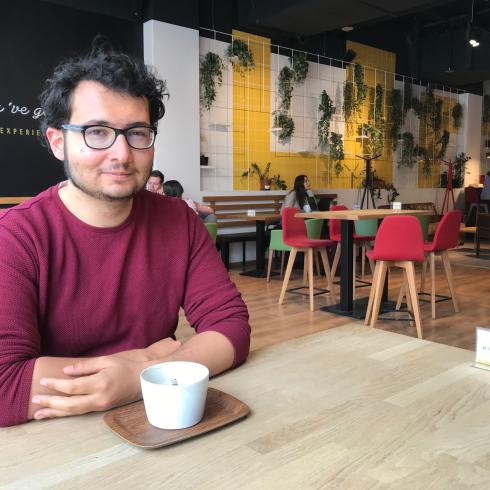
Whereas most people I interview intersperse their train of thought with fillers like “you know,” “actually” and indefinite vowels, Ognyan “Flame” Darinov says “I think.” Thinking is what he does. Flame dropped out of his second Master’s in order to pursue a PHD at the University of Luxembourg. You wouldn’t guess it, but he was only born in 1999.
The Sunday before last, the young Bulgarian won the Prix Laurence. The Prix Laurence is a youth literature prize and one of the many events of the LiteraTour festival, happening right now in Bettembourg. Backed by the horsepower of Esch2022, this seventh edition has stepped its game up. The competition was open to the Greater Region, Portugal, Italy and Lithuania, the latter via Kaunas 2022, a sister European Capital of Culture.
Attendees were ushered into a huge tent set up in front of Bettembourg castle. The word tent doesn’t really do it justice, though, with its cozy booths, wooden parquet and church-inspired windows. Inside, white t-shirts glow a faint purple. You feel cut off from the outside world. The caws of local crows and the occasional church bell are the only reminders it still exists.
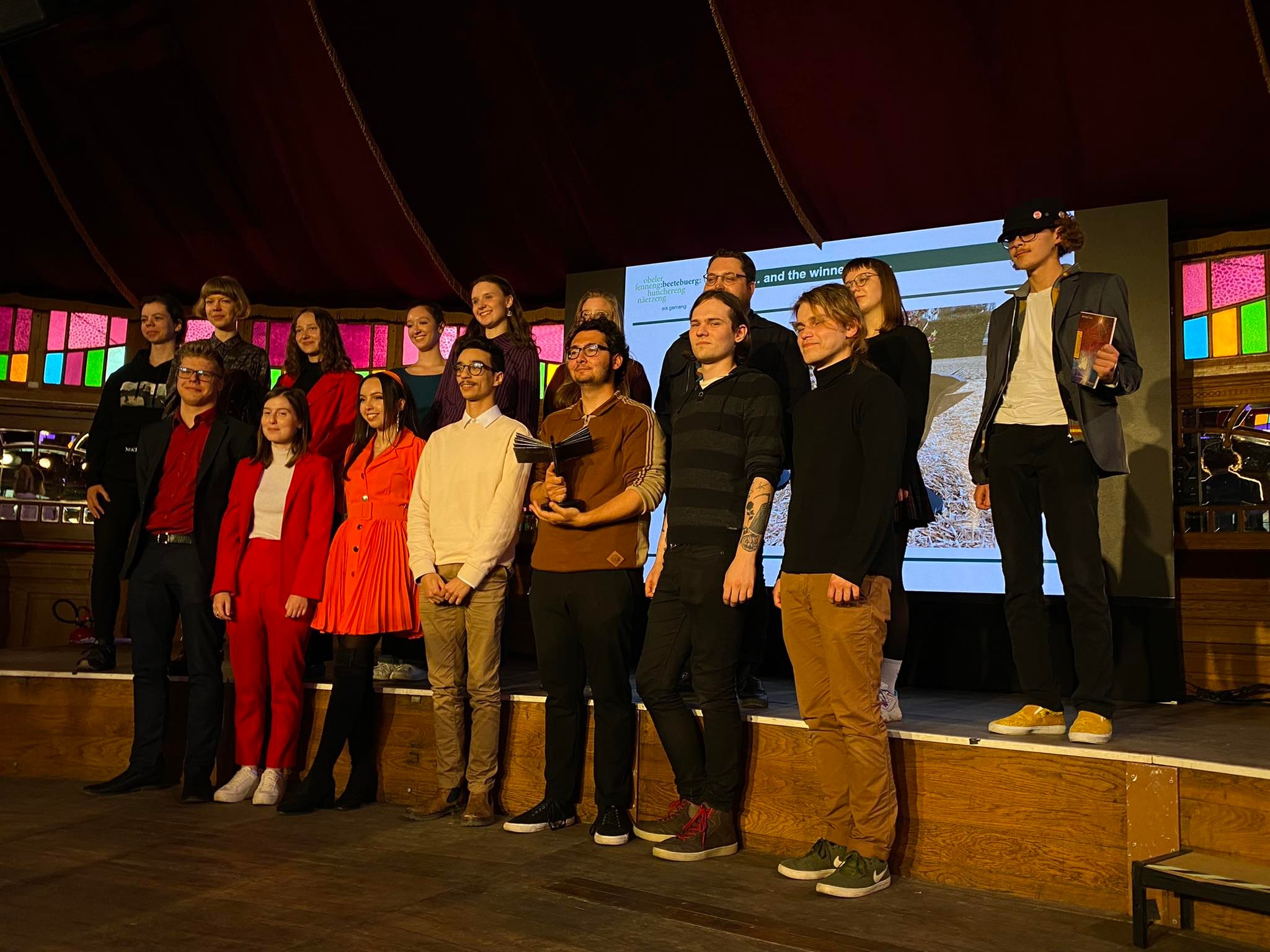
Impressions from the Prix Laurence © Sandy Heep
Anne, the witty host, explained that visitors could read translated versions of the competing texts via the QR code provided by the organisers. She added that a dance troupe led by Claudia Urhausen would perform pieces specifically designed for the event. She then invited the finalists on stage and prose and poetry of all shapes and forms unfolded.
Camal Tahireddine’s poem about being stuck in a web of lies was mirrored by its intricate rhyme structure; Rawil Zayn paid tribute to the unsung hero Isabelle Eberhardt; Kelpšas Jovaras spoke of ducks destroying capitalism; Matulionis Dominykas’s search for happiness has him fall out with an old man and Flame’s The Laddie at the Lake sees a sailor and an Italian-speaking merman miscommunicate. He knew his text by heart. Every inflection was studied and underlined with at times subtle, at times extravagant body language.
The jury deliberated for an hour. Flame went home with a weighty trophy; a steel crow beating its wings which form the pages of a book. Two days later, he and I met up in Golden Bean. The coffee joint is adjacent to the university campus and home to many a student. Semi-aware of Orthodox rites for Easter, but really just wanting to show off, I greeted Flame with the traditional paschal address.
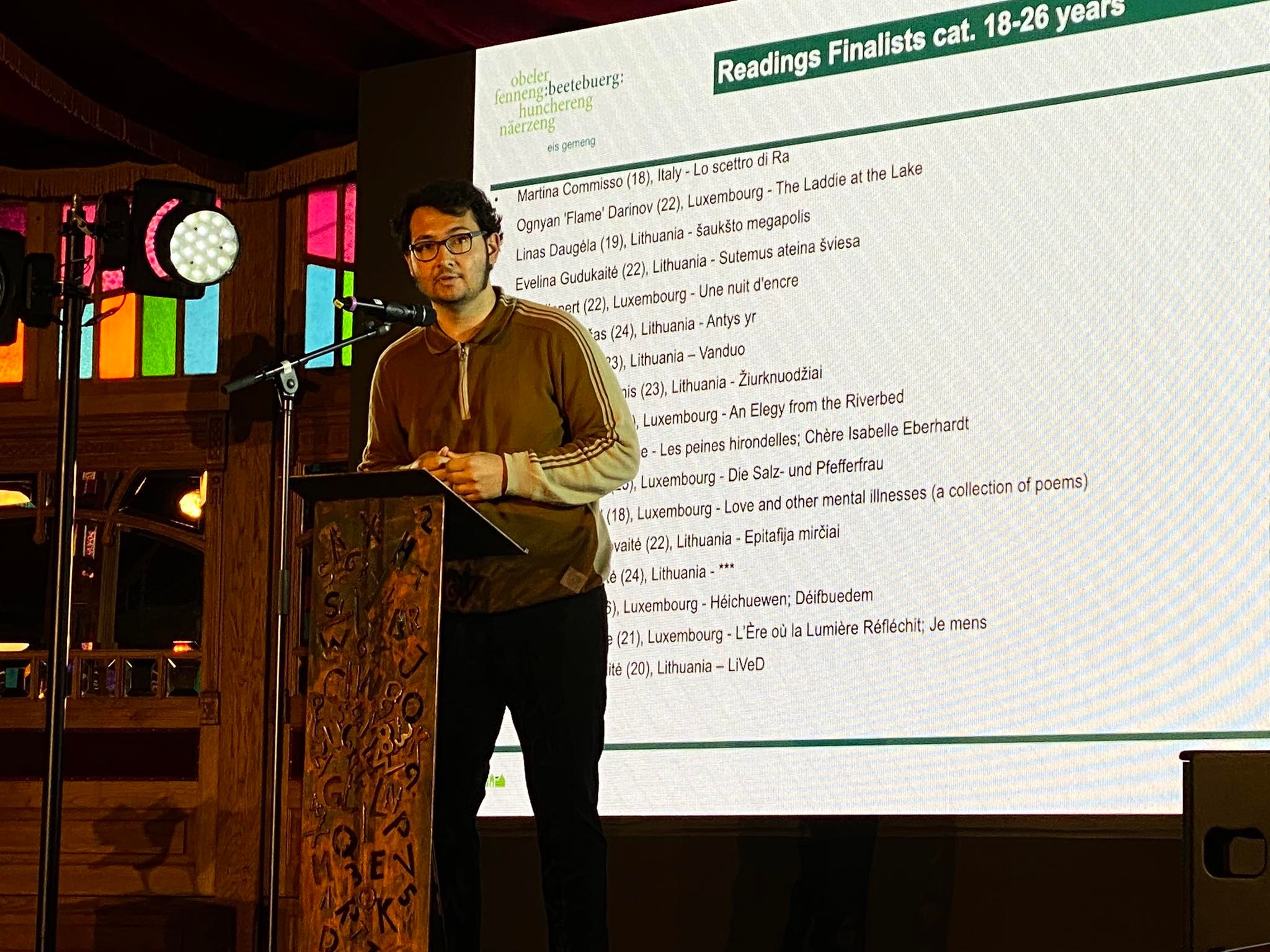
Impressions from the Prix Laurence © Sandy Heep
Christ is risen.
Truly, he is risen.
The Prix Laurence finals coincided with Orthodox Easter and the French elections. Were either of these in the back of your mind that day?
I was indeed thinking about Orthodox Easter. I was thinking how my parents were celebrating. Maybe I should be celebrating the same day. And because we had Lithuanians in the audience, I actually wanted to say happy Easter to them too. But before I went on stage I googled and saw that they’re mostly Catholic in Lithuania, so I didn’t wish happy Easter to the Catholics. I would have been a week late, it would have been very awkward. I can’t say I was really thinking about the French elections. It’s probably weird to everyone to hear that because I’m sure everyone else was thinking about it.
Despite years of rapprochement, Western and Eastern Europeans still have prejudices against each other and sometimes operate in binary distinctions. What are they, what perpetuates them and how can we fight them?
It’s a big list of things. I think the way I can address it and talk about it is in terms of mentality. It’s definitely true that on the European continent, we have different ways of telling our histories, of understanding our neighbours and ourselves, of understanding the world outside of the European continent. But how we think about these things matters more than what these things are. This is why propaganda is so effective. You know, in a place like Bulgaria and Eastern Europe, we do the same thing people do and did in the UK, especially England: we talk about Europe in the third person. I never really saw it as a problem until I came to Luxembourg and I started to realise that people here talk about Europe in the first person. It’s suddenly much weirder when you talk to people from Bulgaria, a country which has been in the European Union for more than a decade now, and see that they still do not think of themselves as European, that Europe is still a third entity to them. And this comes from both sides, right? It’s not just the people in Bulgaria who are distancing themselves from Europe. It’s also the European project, sometimes, in different ways, forgetting about the edges of the European Union. They are definitely in the equation, but it often feels like you forget they’re in the equation.
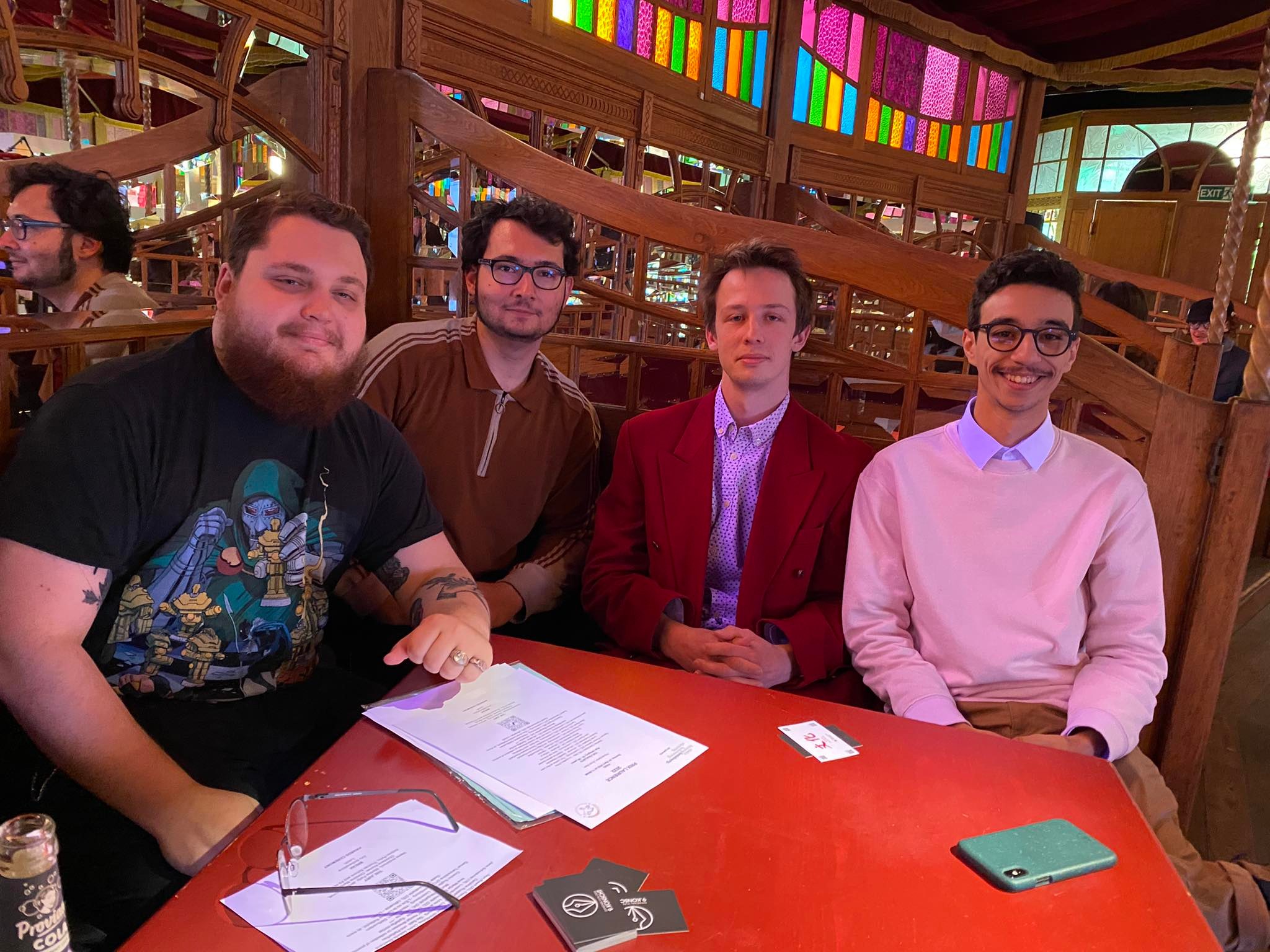
Impressions from the Prix Laurence © Sandy Heep
And what I really liked about the Prix Laurence this year was that if you do look at a map of Europe, you will see Italy, Portugal and Lithuania are very much the edges of the European Union and that there is an effort to really bring in people to what is considered the heart of Europe. I think programmes like Erasmus and exchanges between universities or even just cultural exchanges are programmes which can start fixing this problem of this sense of divide between East and West. But of course, there’s a lot more work to be done. There are economic dimensions which I do not have the expertise or the ability to talk about. There’s politics involved, how to reconcile different narratives of nation building we have in each country. I think literature is one of the avenues that can work towards that, reconciling narratives of nation building and figuring out how we can live in Europe together, not as East and West but as one entity ideally.
Let’s go down that avenue, then. Bulgaria has a unique history of literature.
Yes.
Can you sum it up for me?
Modern Bulgarian literature as we know it starts a little before the end of the nineteenth century. It is marked as a very important time in history because that’s when Bulgaria gained its independence from the Ottoman Empire. The interesting thing, which we don’t see in Western traditions for example, is that because Bulgarian culture wasn’t seen as thriving until the end of the nineteenth century, a lot of movements and ideas and texts from the West came as an influx rather than slowly coming into the scene. So in our literature, towards the twentieth and twenty-first century, you can actually see a very interesting mixing of Western and Eastern ideas, of time periods which have such a clear distinction, Romanticism, Modernism and Postmodernism and so on, that gain a new face in Bulgaria. This synthesis of literature, I think, is hard to accept for what it is when you first see it because you can’t make sense of it. Because when you’re not very familiar with the traditions of Western art and Eastern art as well, you can’t make the links between what’s similar, what’s different, why is this important, why is this being done? Yeah, that’s the gist. It’s a very interesting mix of elements which you would hardly find in Western traditions, where things are much more rigid.
The way you presented The Laddie at the Lake was more performance than reading. What’s the difference between a performance and a reading?
Wow, that is a research question. (Laughs) That is really a research question. I think for a person to perform a text, it means to internalise the text in a way that’s mechanical and meaningful. What I mean by that is you have to be able to perform the text as it is or very closely to as it is on the page, but you’re also able to show people how you understand the text and what your interpretation of it is. When you have an ambiguous line for example, you have to choose what this line means, is it supposed to stay ambiguous or is it supposed to be angry, or confused? I think a performance is, in a certain sense, a crystallisation of the text. It’s kind of like the same difference you would have between a printed text and a handwritten text. You always have your own flavour in a performance. There is room to discuss whether a reading can be a performance. I think it can be but as I said, I think performance is also about having the mechanics of the text itself down, and not having to feel insecure that you don’t know what the next sentence is.
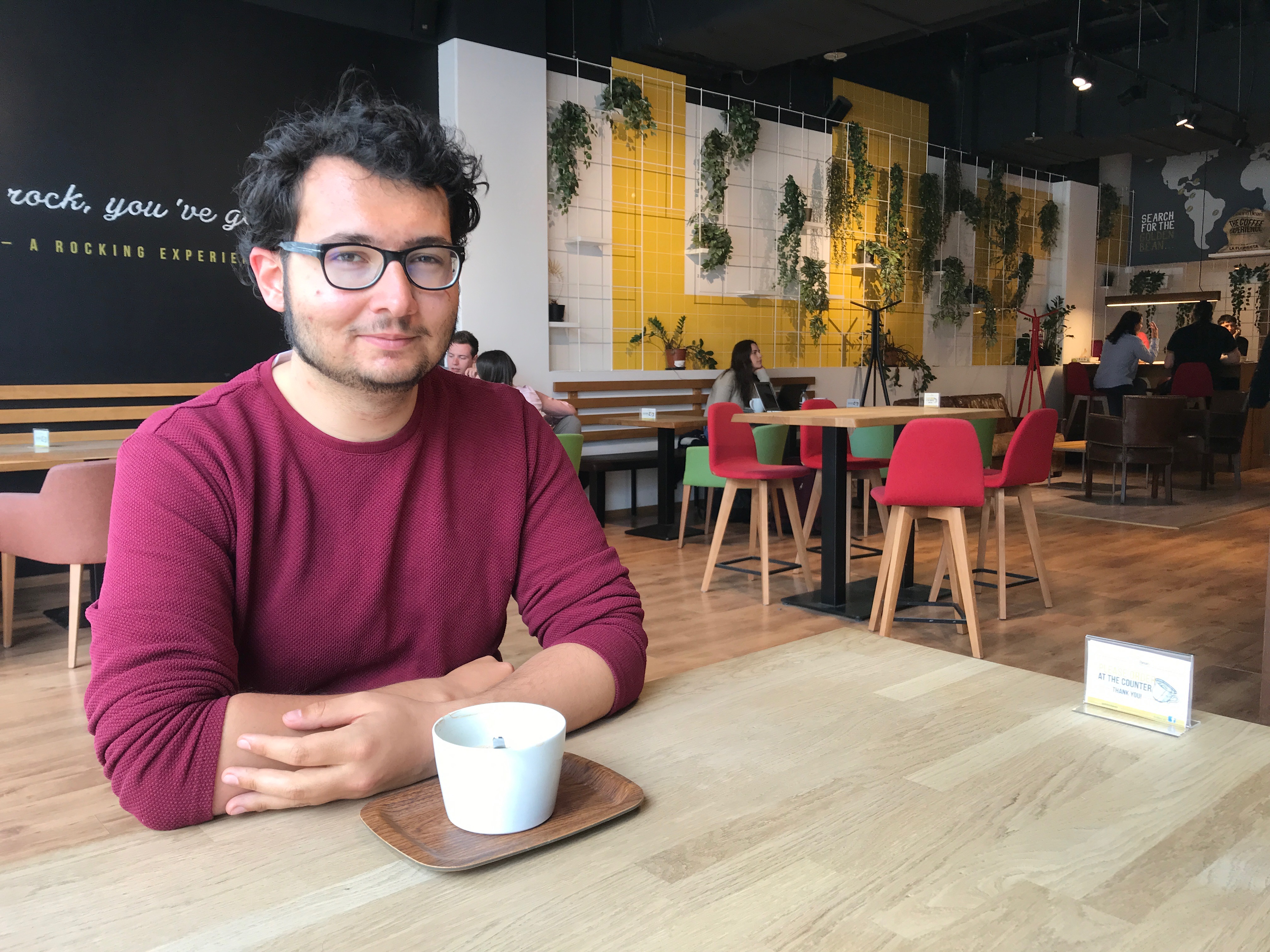
Ognyan “Flame” Darinov © Nicolas Calmes
I mean, it was very moving and all, but the triple backflip at the end wasn’t really necessary.
(Laughs) The triple backflip followed by a split, just to be clear. I know it wasn’t necessary but, you know, if you’re not sure you have the audience’s attention, you just do something crazy on stage and you get it.
The intermezzo dance performances were also moving, since we’re talking about ambiguity. What impression did they make on you?
So, about a year ago was the first time I actually started getting interested in dancing and the movement of the body. I think dance is an excellent way of exploring what your body can express and specifically at the Prix Laurence, what the dance performances kept reminding me of is that there are ways in which our bodies can be controlled that we’re not always aware of. Really good dancers can give the illusion that, for example, their limbs move mechanically or their head is detached from their body. I find that illusion, that performance really inspiring and I have ever since been really trying to put into words what is it like to have an unprecedented control over your body? What is it like to incorporate your body into performing a text or a poem? I think dance is like a very comic strip version of your body moving, showing its limits and how much it can remember. One thing I did like to do and still like to do when watching dancing is to try and judge what’s planned and what’s not, what happens in the moment and what was choreographed before. I’m truly only an amateur when it comes to choreography but I do like to think that the best dances have some kind of spontaneity in them.
Your poem The Laddie at the Lake reminds me of Mulan’s I’ll Make Man Out of You, only that the man-making bit fails or doesn’t happen. What makes someone a man?
I have asked myself this question not just for my poetical work but also for myself. I think part of what makes a person a man is the person being comfortable in their own skin. I, for example, find it very comfortable being a man. I like the social dynamics associated with being a man. I like the way men look. I like the way I look as a man. And I don’t let myself be too bothered by things like how a man’s body is supposed to look or what kind of things a man should eat or not eat or what kind of emotions they should exhibit or not exhibit. One thing that can make a man a man is his confidence in himself. His conviction that he knows who he is. Of course, this would apply to any other gender, not just being a man. But that’s what manhood and masculinity mean to me.
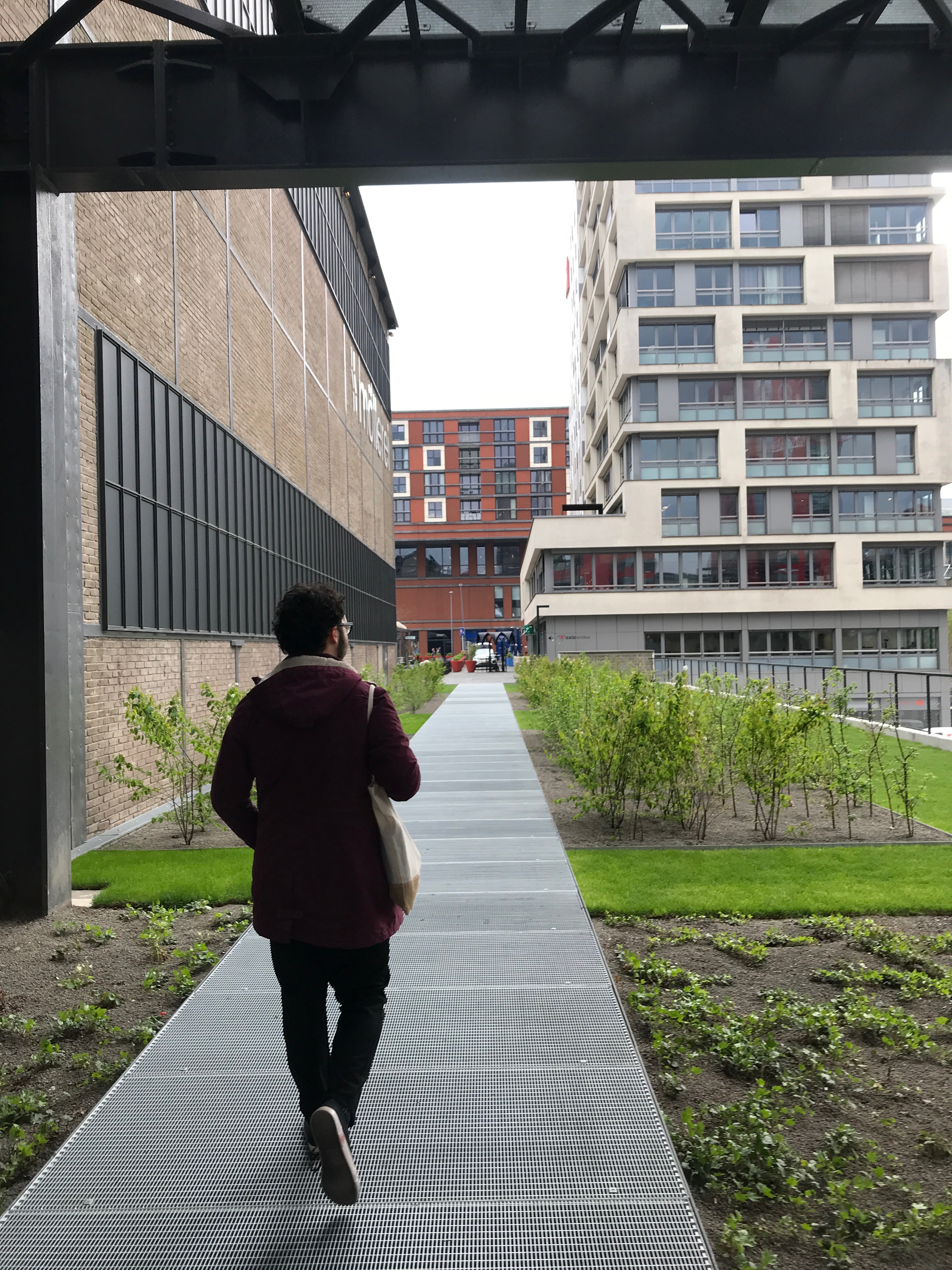
Ognyan “Flame” Darinov © Nicolas Calmes
One of the characters in The Laddie at the Lake speaks Italian. Why Italian? Do you speak Italian?
I do speak a little Italian. I speak more Spanish than I do Italian. Why Italian? Poems are things that happen very differently at different moments of time. There’s no rest before success for a poem. In this one, the Italian came from me looking up what the Italian word for sailor is. I was writing poems about sailors at the time. I lived in a port city, Edinburgh. The sea was nearby and I was thinking about sailors. I just looked up what the Italian word for sailor is and marinaio, it has a so-called triphthong towards the end, aio, which is not a cluster of sounds you see a lot. I thought, oh, this looks like a challenge to rhyme but it also looks fun to rhyme. I wanted to see where I could go from there. I remember when I was writing my poem, I came to the merman appearing and I said: “Now he should greet the stranger, so he says: Salve, marinaio, why don’t you cry-oh save me!” I rhymed it with cry-oh. In English, you don’t really have that sound pattern together unless you put two words which have those sounds together. “You and I-obey different voices.” Anyway, you get the point. I think the next thing to push for in my personal poetry is rhyming between languages. I’m happy to say this poem is a good start.
Many texts, including yours, featured water as a motif. What do you think it is about water that makes it so prevalent in literature?
I think what makes water prevalent in literature is also what makes water prevalent in our lives. When people wanted to build a new city, they would settle near water, near a river. Because of its properties, because we need water to live, because it can wash things. Also because we can reflect on it in many senses. We can use it as a mirror. Mirrors didn’t always exist. We can also use it as a place for thinking outside of ourselves and there is something deeply cultural, no, I think there’s something deeply human about water. Even across cultures, people revere water. Of course, I have not studied every culture on earth but I don’t know of a culture that fears water in a general sense. I was also surprised that so many poems were about water this year. At first, I thought it has something to do with the Luxembourgish myth of Melusina and Siegfried. I’m afraid I don’t have an answer. I think water is just a very human thing in many ways.
These were all of my questions. Is there anything else you’d like to say?
Yes. I guess there is one thing. I’ve said this in other interviews as well, but I think it’s really the one thing I want people to hear. I think the writing that happens in the next few decades, one of the things it should achieve is to help people disassociate a language from a country. English is a language I’ve loved long before I ever set foot in a country that speaks English, long before I found English language artists that I like. I think in a perfect world human beings will understand that languages are something that belongs to us as a species and not to political states. As hard as it is, I think it’s becoming a little easier to at least imagine a language like English not belonging to a country or some countries. I think eventually, we have to learn that no language belongs to countries or a country. As long as you choose a language, you want to know a language and to speak it, then it is already yours.
Les plus populaires
- 26 juin. 2024
- 28 juin. 2024
- 05 juil. 2024
- 04 juil. 2024
ARTICLES
Videos
26 juil. 2024TAPAGE avec Ruth Lorang
Articles
22 juil. 2024Le fabuleux destin de Raphael Tanios
Videos
19 juil. 2024

